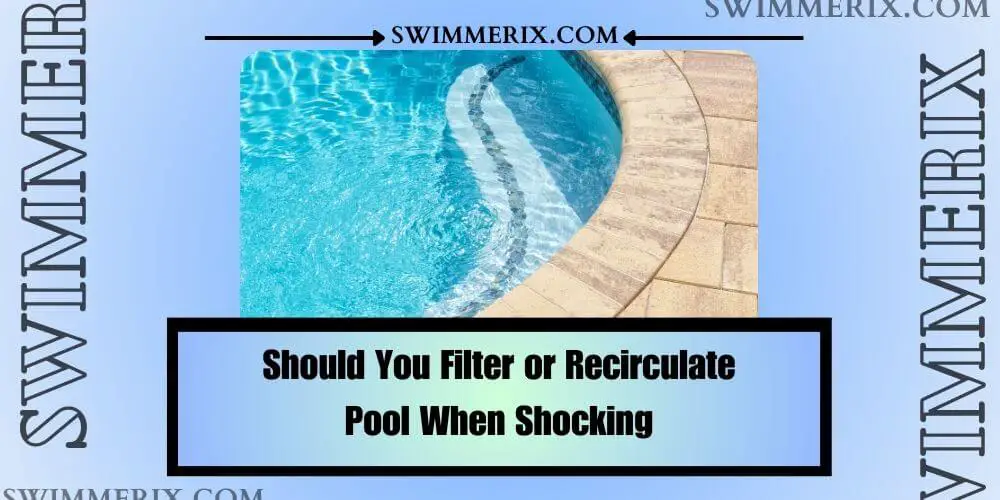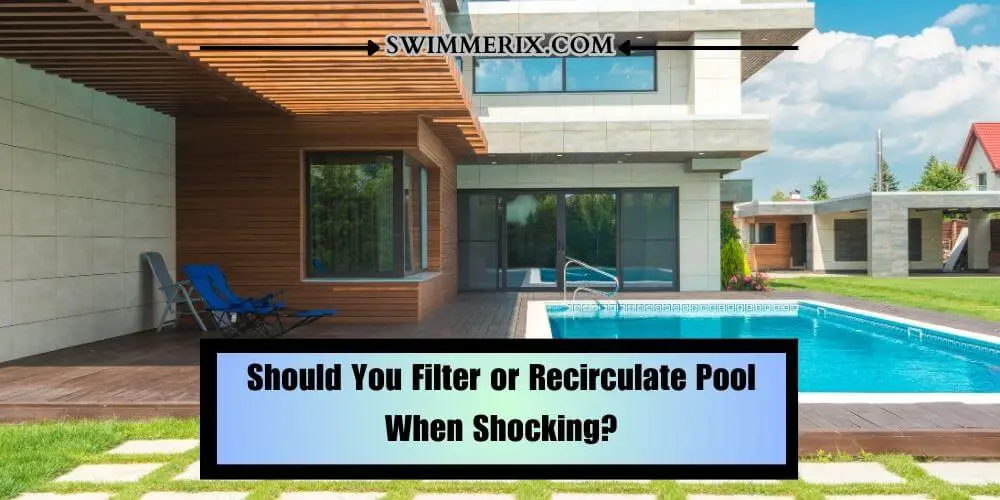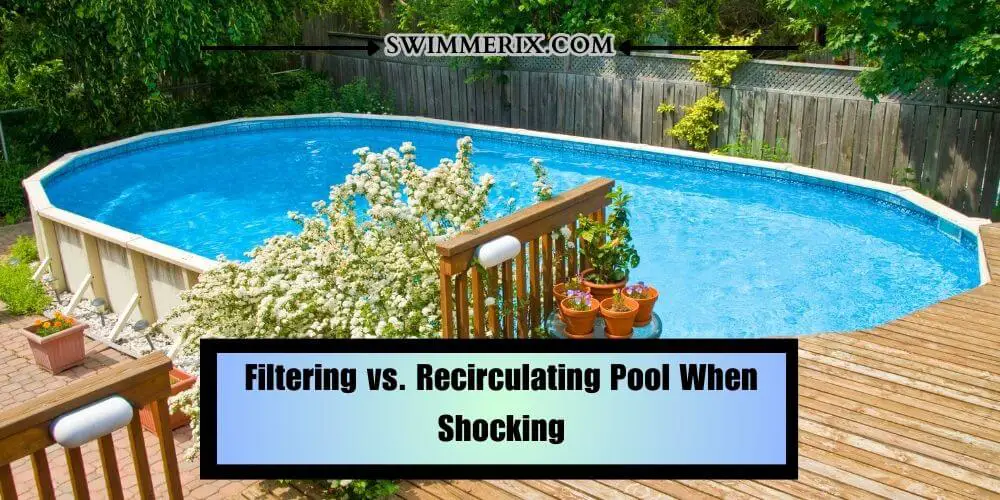
Who wouldn’t want to take a refreshing dip in a pool on a hot summer day? However, if you own a pool but the water looks slightly cloudy & dull, it is time for a shock treatment. But, when you shock the pool water, you often wonder “Should You Filter or Recirculate Pool When Shocking”
In this article, I will discuss the topic of ‘filtering or recirculating pool water when shocked and also delve into the ins & outs of pool maintenance during shock. We will also talk about the benefits of filtering & recirculating with practical tips to help ensure your pool remains pristine. But, before all of this, let’s find out the answer to the question: Should You Filter or Recirculate Pool When Shocked?
Should You Filter or Recirculate Pool When Shocking?

When shocking a pool, running the filtration system and recirculating the water is generally recommended. This helps distribute the shock treatment evenly throughout the pool & allows the filtration system to remove any debris or contaminants that may be present.
As per myperfectpool.com, you must run the filtration system properly for several hours to distribute the shock treatment evenly throughout the pool. This not only helps in achieving effective sanitization but also kills any bacteria, algae, or other contaminants present in the water. Along with it, it also helps in enhancing water circulation & faster recovery.
We all know that pool shock is very important to eliminate contaminants from the water. You must consider filtering and recirculating people with low incomes along with it. Since the pool shock involves adding a high concentration of chlorine or other chemicals to the pool water that is necessary to eliminate contamination, bacteria, algae & other organic matter that might accumulate over time, ensure appropriate guidelines on usage, dosage, & application.
It’s not uncommon to wonder whether you should filter or recirculate pools when shocking to distribute the treatment evenly throughout the water. Below I’m mentioning the benefits of filtering & recirculating when shocking, along with optimizing the treatment more effectively. Below, you will understand the role of each method & specific circumstances that warrant filters or recirculation use.
Filtering vs. Recirculating Pool When Shocking

Should You Filter the Pool When Shocking?
Yes, it would help if you filtered the pool during shock, as it’s a common practice that offers many benefits. When you use the filtration system, you effectively remove debris, organic matter, and contaminants from the water. This process not only enhances the effectiveness of the shock treatment in pools but also improves water clarity & quality.
3 Benefits of Filtering During Shocking
Debris Removal
If you are shocking a pool, it’s not uncommon for debris like leaves, insects, or other particles to stir up. Therefore you might have to run the filter to ensure these unwanted elements are trapped and removed, preventing them from settling back into the water. Also, you should clear away the skimmer basket & clean the filter after running it, especially to prevent clogging as well.
Enhanced Shock Treatment
The filtration system is a powerful ally when providing a shock treatment to your pool. As the water passes through your filter media, chlorine and other sanitization agents will have more contact times with contaminants, which further maximizes their effectiveness in killing the bacteria and neutralizing organic matter.
Water Clarity & Quality
After shocking the pool, you might worry about the water’s cloudiness, which is normal. Many people wonder “Why is the Pool Cloudy After Shock“. Actually, When you introduce a high chlorine concentration, the water in your pool becomes cloudy. Therefore filtration can be very effective in clearing out the cloudiness to ensure the sparkling Oasis.
If you continuously filter the water during shocking, you will ensure that these suspended particles are being trapped, resulting in improved water quality as well as clarity for an inviting swimming experience
3 Tips For Optimising Filtration During Pool Shocking
To make the most of filtration during shocking, consider the following tips:
- Regular Cleaning & Maintenance: After running the filter, you must clean and maintain it properly to prevent clogging or accumulation of debris. Also, make sure that you clean & replace the filter media as required or recommended by the manufacturer to ensure optimal performance and the filter system being in top shape.
- Timing & Duration: You’ll also have to pay attention to the filtration system’s runtime during the shock treatment’s initial stage. When the debris is being stirred up, you must run the filtration system for an extended period. Also, ensure that you adjust the duration based on the pool size and the contamination’s severity.
- Choosing the Right Filter Media: You may already know that different types of filter media, like sand or cartridges, have different capabilities. Therefore, you must thoroughly Research and choose the right type of filter media that best suits your pool need for optimal performance & efficiency.
Should You Recirculate the Pool When Shocking?
For most pool owners, filtering is the go-to method during shocking because it offers many advantages. However, recirculating the pool when shocked will also provide certain advantages depending on specific circumstances since recirculation involves redirecting the pool water without passing it through the filtration system.
Consider it for appropriate chemical distribution evenly in your pool water and address any localized pool issues. Let’s look at some of the advantages recirculation offers when shocking.
3 Benefits of Recirculating During Shocking
Chemical Distribution
First of all, recirculating the pool during shock further helps distribute the added chemical evenly throughout the water. This again ensures that the shock treatment reaches all the corners of your pool, leaving no area untouched. Recirculating is helpful when shocking the pool to clear off algae spores, contaminants, or debris accumulated on the pool surface.
Addressing Localised Pool Issues
Recirculation can be very useful for you if you’re dealing with localized pool problems. When you redirect the water flow strategically, you can target areas requiring extra attention, like spots with heavy algae growth, persistent cloudy patches on the pool surface, wall, railings, or White Stuff on the Bottom of the Pool After Shocking.
Suspended Particles
If your pool contains a high concentration of suspended particles, the filtration will be less effective. Pool Filter Not Filtering Fine Particles is a common issue. Therefore, you must recirculate your pool during shock to allow the chemical to work on these particles appropriately while further promoting their settlement and subsequent removal through the filtration system.
3 Tips For Effective Recirculation During Pool Shocking
To ensure effective recirculation during pool shocking, keep the following tips in mind:
- Water Flow & Circulation Patterns: Pay attention to your pool circulation pattern and adjust the recirculation accordingly. You might have to redirect the returning Jet or use an additional pump to create the desired flow & distribution of chemicals in your pool. Therefore, always consult a professional for further assistance on the right approach.
- Timing & Duration: Just like filtration, you will also have to adjust the duration of recirculation based on your pool type as well as condition. Therefore, I’ll advise you to monitor the progress of the shock treatment and then make necessary adjustments as required.
- Monitoring & Adjusting Chemical Levels: During recirculation, you must test the water chemistry to ensure appropriate chemical levels are being maintained & distributed throughout your pool water. It is highly recommended to use a reliable testing to can accurately measure chlorine level PH and other important parameters to make appropriate adjustmired.
Conclusion
No doubt that maintaining a clean & clear pool requires shock treatment from time to time to enjoy a safe & fun swimming experience. However, if you need clarification about choosing a filter or the circulating pool when shocking, I will advise you to do both for effective treatment.
However, there will be some specific cases where recirculation will not be required. Both methods have their advantages and serve the specific purposes that we discussed. Suppose you implement all the suggested tips mentioned in this article and understand the benefits.
In that case, you can ensure your pool stays in top-notch condition while providing a refreshing oasis for you, your family, your friends & loved ones to enjoy throughout the summer and beyond.
I have given my best to give you proper knowledge on the question: should you filter or recirculate pools when shocked? If you have any other questions regarding the topic of filtering or recirculating the pool when shocking, make sure to drop a comment below. Consider sharing this article if you find it helpful and fun to read.
Your share will not only help people learn if they should filter or recirculate pools when shocking but also the specific purposes & advantages of both methods. Check my other helpful pool care & Management guide for a crystal-clear oasis that looks pristine. See you in the next post, till then, take care & goodbye.

